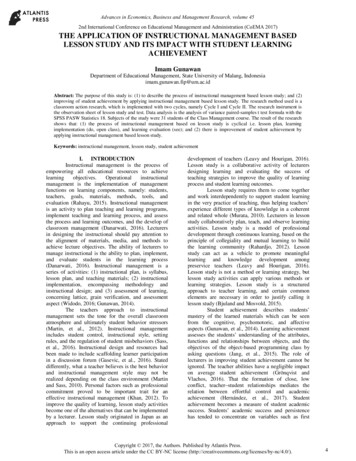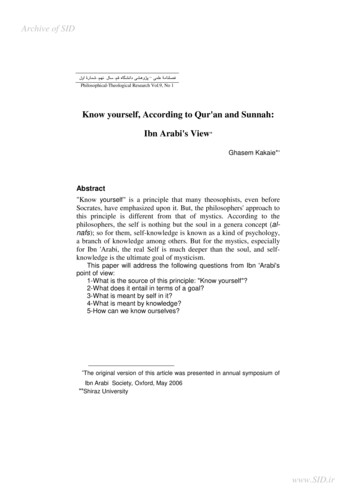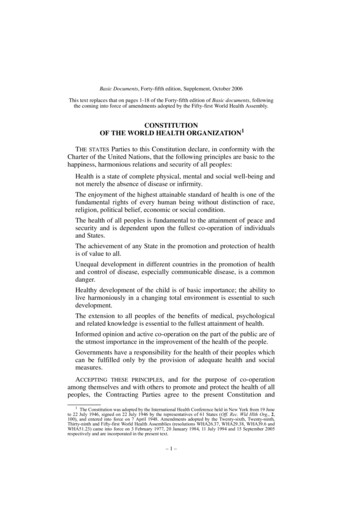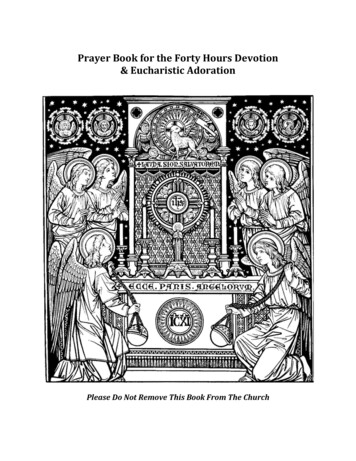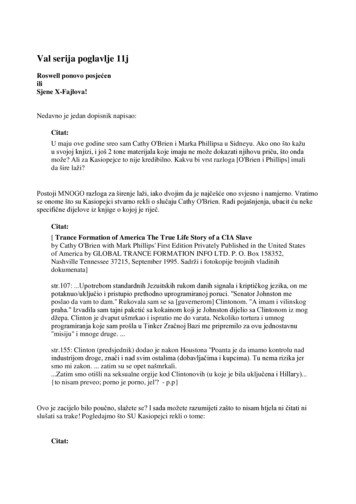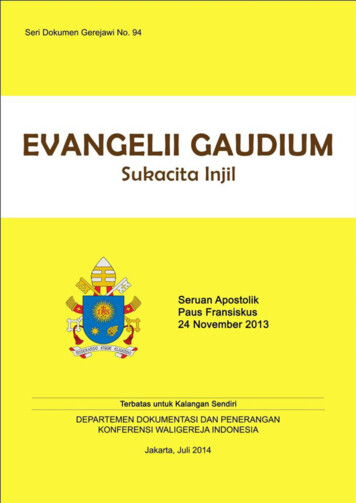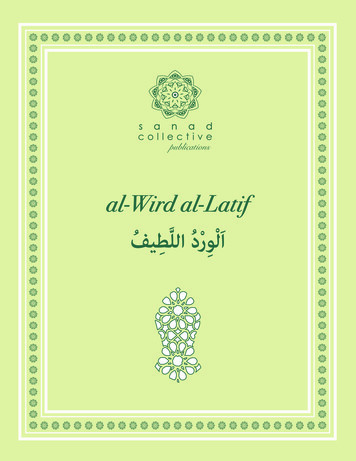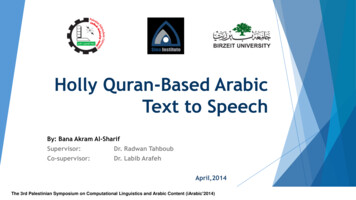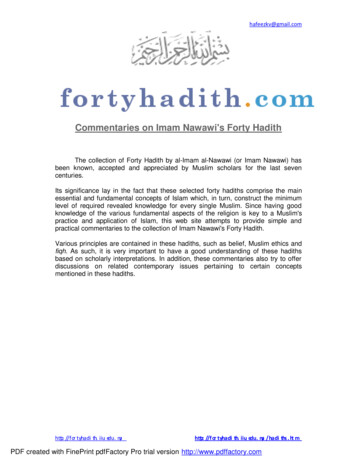
Transcription
hafeezkv@gmail.comCommentaries on Imam Nawawi's Forty HadithThe collection of Forty Hadith by al-Imam al-Nawawi (or Imam Nawawi) hasbeen known, accepted and appreciated by Muslim scholars for the last sevencenturies.Its significance lay in the fact that these selected forty hadiths comprise the mainessential and fundamental concepts of Islam which, in turn, construct the minimumlevel of required revealed knowledge for every single Muslim. Since having goodknowledge of the various fundamental aspects of the religion is key to a Muslim'spractice and application of Islam, this web site attempts to provide simple andpractical commentaries to the collection of Imam Nawawi's Forty Hadith.Various principles are contained in these hadiths, such as belief, Muslim ethics andfiqh. As such, it is very important to have a good understanding of these hadithsbased on scholarly interpretations. In addition, these commentaries also try to offerdiscussions on related contemporary issues pertaining to certain conceptsmentioned in these hadiths.h p: //for tyhadi th. iiu. edu. myh p: //f or tyhadi th. iiu. edu. my /hadi ths . ht mPDF created with FinePrint pdfFactory Pro trial version http://www.pdffactory.com
hafeezkv@gmail.com1. Actions are judged by intentionsIt is narrated on the authority of Amirul Mu'minin, Abu Hafs 'Umar bin al-Khattab, radiyallahu 'anhu,who said: I heard the Messenger of Allah, sallallahu 'alayhi wasallam, say:"Actions are (judged) by motives (niyyah), so each man will have what he intended. Thus, hewhose migration (hijrah) was to Allah and His Messenger, his migration is to Allah and HisMessenger; but he whose migration was for some worldly thing he might gain, or for a wife hemight marry, his migration is to that for which he migrated."[Al-Bukhari & Muslim]backgroundThis hadith was said by the Prophet, sallallahu 'alayhi wasallam, at the time when a man emigratedfrom Makkah to Madinah during the Hijrah for the sake of marrying someone and not for the sake ofIslam.It is considered to be one of the greatest hadiths in Islam.Al-Imam al-Shafie said: This Hadith is one third of the knowledge of Islam; related to about 70 topicsof Fiqh.Al-Imam Ahmad (with reference to al-Imam al-Shafie's statement) said: Islam is based on threefundamentals (all are among the 40 hadiths ):i.Hadith 1: which is stated above.h p: //for tyhadi th. iiu. edu. myh p: //f or tyhadi th. iiu. edu. my /hadi ths . ht mPDF created with FinePrint pdfFactory Pro trial version http://www.pdffactory.com
hafeezkv@gmail.comii.iii.Hadith 5: "Whosoever introduces into this affair of ours (i.e. Islam) something that does notbelong to it, it is to be rejected."Hadith 6: "Truly, what is lawful is evident, and what is unlawful is evident, and in between thetwo are matters which are doubtful which many people do not know "These three hadiths are agreed upon by Al-Bukhari and Muslim.These hadiths can be seen as three criteria to help Muslims evaluate and judge what they do and say"as an ibadah" in their daily life:i.ii.iii.Hadith 1 - To evaluate and judge our internal actions (actions of the heart).Hadith 5 - To evaluate and judge our external actions (actions of the limbs).Hadith 6 - To evaluate and judge our dealings "mu'amalat" (interaction between people).Niyyah (intention) has two meanings:i.ii.The intention before an ibadah (e.g. prayer)The willingnessThe second meaning (ii.) is what is meant in this hadith.lessonsThe Prophet, sallallahu 'alayhi wasallam, starts the hadith with the principle ("Actions are judged byintentions") and then gives three examples. This is the methodology of the Prophet, sallallahu 'alayhiwasallam. The examples help illustrate the principle so that it is easier for people to understand andthey can apply the principle to other similar situations.The three examples consist of one of good intention (migration for the sake of Allah and HisMessenger) and two of bad intentions (migration for the sake of worldly gains or for marriage).This hadith emphasises ikhlas (sincerity - to be truthful and honest to Allah alone, performing an actsolely for Allah's sake whereby no other witness except Allah is sought). Ikhlas is one of theconditions of accepting good deeds. The other condition is that the actions must be done inaccordance with the Shariah as it will be explained in the fifth hadith.This can be seen in the shahadah : "I bear witness that there is no god but Allah" is the ikhlas - ensuring that we do things for thesake of Allah and Allah alone."I bear witness that Mohammed is the Messenger of Allah" - the Sunnah is the manifestationof the Quran - the Prophet, sallallahu 'alayhi wasallam, is our example, our best model tofollow. Following his Sunnah in our ibadah, Akhlaq (ethics), and Muamalat (dealings) ensuresthat we are acting in accordance with the Shariah.Thus, the shahadah shows us the conditions for accepting a deed or performing an action: (a) itshould be for the sake of Allah because He is the only One we worship, and (b) it should be inaccordance with the Shariah.h p: //for tyhadi th. iiu. edu. myh p: //f or tyhadi th. iiu. edu. my /hadi ths . ht mPDF created with FinePrint pdfFactory Pro trial version http://www.pdffactory.com
hafeezkv@gmail.comTo achieve ikhlas, we have to avoid shirk (associating others with Allah, which causes insincerity). AlImam al-Harawi said the root cause for insincerity (or shirk) is self-desire (al-hawa). Therefore noaction should be done because of self-desire.Imam al-Harawi states that there are 7 types of self-desires:i.ii.iii.iv.v.vi.To make oneself appear good in the hearts of othersTo seek the praises of othersTo avoid being blamed by othersTo seek the glorification of othersTo seek the wealth/money of othersTo seek the services or love of othersTo seek the help of others for oneselfvii.Ways to obtain ikhlas: Do righteous deeds - the more good deeds we do and hence get closer to Allah, the moresincere we will be.Before we do any deed we should firstly seek knowledge (ilm) - our actions/deeds should beguided by knowledge so that we do them in accordance to the Shariah.Do not give false impressions - do not make others believe that an action we did was goodwhen it was not.Al-Imam Ahmad said: Before you do anything, check your intention (niyyah) - ask yourselfbefore performing an action: "Is it for the sake of Allah?"Ibnu al-Qayyim says: Any action we do is subject to three defects:i.ii.iii.Being conscious that others are observing our actionsSeeking a return (benefit/reward) for the actionBeing satisfied with the actionExamples: If we go to the masjid for the salah and we are early, arriving before the Imam andfinding a place in the first saff, we should not be proud of ourselves and think ofourselves being better than others. We should praise Allah for enabling us to go tothe masjid and for being able to perform the salah without any difficulties.After every salah, we should tell ourselves that we could have performed it better andtry to improve in our next salah.What happens if we were to change our niyyah while performing an action? Ibn Rajab says accordingto the ulama' if the niyyah at the end of the action matches the beginning (i.e. doing the action for thesake of Allah), then any changes in the middle of the action will be forgiven or does not matter, inshaAllah. However, if the niyyah at the end does not match the beginning, i.e. we do the action for otherthan the sake of Allah, then we must repent (taubah).There are four things that contradict ikhlas:i.ii.Ma'siat - committing sins - this will weaken our ikhlasShirk - associating others with Allahh p: //for tyhadi th. iiu. edu. myh p: //f or tyhadi th. iiu. edu. my /hadi ths . ht mPDF created with FinePrint pdfFactory Pro trial version http://www.pdffactory.com
hafeezkv@gmail.comiii.Riya' - performing an ibadah with the intention of showing off to othersNifaq - hypocrisyiv.Even though we must always make sure that our actions do not deviate from ikhlas, there are actions,which are automatically considered that of good intentions. For example, seeking knowledge in Islam,helping the community, doing da'wah, etc.Some rulings (ahkam) which scholars derived from this hadith: When people 'swear by Allah' by saying "Wallahi" every now and then, their intention is notthat they actually swear by Allah. They say it simply out of habit - it readily rolls off theirtongue. Hence, it is harmless. However a Muslim should do his/her best to minimize it.When someone is asked to give an oath, what is judged is his intention when he gives theoath.There can be a combination of intentions between performing an ibadah and teaching others we perform an ibadah for the sake of Allah, but we also do it with the intention of teachingothers. e.g. when the Prophet, sallallahu 'alayhi wasallam, performed the Hajj, he did it for thesake of Allah as well as for teaching the Sahabah (his companions, may Allah be pleasedwith them all).A man may go through the process of divorcing his wife, verbally or in court, but it is hisintention which counts.What could be seen as ghibah (backbiting - talking bad, but true, things about a personbehind his back) could simply be a joke or a dua. If someone talks bad about someone else, itis his intentions, which determines whether it is ghibah or not.conclusionOur actions are undermined by our intentions - whether they are good intentions or bad intentions.Therefore we should always check our intentions before we do or say anything. We must make surethat the action is for the sake of Allah so that it is accepted by Allah and that we will be rewarded for it,insha Allah.h p: //for tyhadi th. iiu. edu. myh p: //f or tyhadi th. iiu. edu. my /hadi ths . ht mPDF created with FinePrint pdfFactory Pro trial version http://www.pdffactory.com
hafeezkv@gmail.com2. Islam, Iman, Ihsan, QadarAlso on the authority of 'Umar, radiyallahu 'anhu, who said:h p: //for tyhadi th. iiu. edu. myh p: //f or tyhadi th. iiu. edu. my /hadi ths . ht mPDF created with FinePrint pdfFactory Pro trial version http://www.pdffactory.com
hafeezkv@gmail.com"While we were one day sitting with the Messenger of Allah, sallallahu 'alayhi wasallam, thereappeared before us a man dressed in extremely white clothes and with very black hair. Notraces of journeying were visible on him, and none of us knew him.He sat down close by the Prophet, sallallahu 'alayhi wasallam, rested his knee against histhighs, and said, O Muhammad! Inform me about Islam." Said the Messenger of Allah,sallallahu 'alayhi wasallam, "Islam is that you should testify that there is no deity save Allahand that Muhammad is His Messenger, that you should perform salah (ritual prayer), pay thezakah, fast during Ramadan, and perform Hajj (pilgrimage) to the House (the Ka'bah atMakkah), if you can find a way to it (or find the means for making the journey to it)." Said he(the man), "You have spoken truly."We were astonished at his thus questioning him and telling him that he was right, but he wenton to say, "Inform me about iman (faith)." He (the Messenger of Allah) answered, "It is that youbelieve in Allah and His angels and His Books and His Messengers and in the Last Day, and infate (qadar), both in its good and in its evil aspects." He said, "You have spoken truly."Then he (the man) said, "Inform me about Ihsan." He (the Messenger of Allah) answered, " It isthat you should serve Allah as though you could see Him, for though you cannot see Him yetHe sees you." He said, "Inform me about the Hour." He (the Messenger of Allah) said, "Aboutthat the one questioned knows no more than the questioner." So he said, "Well, inform meabout the signs thereof (i.e. of its coming)." Said he, "They are that the slave-girl will give birthto her mistress, that you will see the barefooted ones, the naked, the destitute, the herdsmenof the sheep (competing with each other) in raising lofty buildings." Thereupon the man wentoff.I waited a while, and then he (the Messenger of Allah) said, "O 'Umar, do you know who thatquestioner was?" I replied, "Allah and His Messenger know better." He said, "That was Jibril.He came to teach you your religion.""[Muslim]backgroundAl-Imam Muslim says: Towards the end of his life, Abdullah bin 'Umar (the son of 'Umar bin alKhattab) was told by two people that a new Islamic sect had emerged from Iraq. They were called AlQadariah and they denied al-qadar (fate). Thus Abdullah bin 'Umar narrated this hadith whichmentions qadar as one of the pillars of Iman to refute the misconception of this sect.lessonsThis hadith teaches the adab (ethics) of seeking knowledge: We should be clean and wear clean clothes.We should sit properly and closer to the speaker.Asking questions for better understanding.Seek knowledge from the right source/authority.The method of seeking knowledge is through asking questions: The type of questions we ask should be meaningful - questions that will lead to valuableknowledge and good action.h p: //for tyhadi th. iiu. edu. myh p: //f or tyhadi th. iiu. edu. my /hadi ths . ht mPDF created with FinePrint pdfFactory Pro trial version http://www.pdffactory.com
hafeezkv@gmail.comAsking good questions will result in better learning as well as teaching. Those who arepresent when the questions are asked will also learn from the answers - thus, the questioneris teaching the others.When Ibn Abbas, one of the greatest Scholars among the Sahabahs, was asked how heobtained all his knowledge, he replied: "with an inquisitive tongue (i.e. he always askedquestions) and a contemplating heart".In many hadiths the Prophet, sallallahu 'alayhi wasallam, himself will start by asking questionsbefore he imparts with knowledge. Asking questions will prepare the mind/heart so that it willbe ready for the answers/knowledge - ready to absorb and learn. In this hadith he calls Jibril"the questioner" which implies full appreciation and encouragement of asking questionsspecially the ones that will lead to gaining more knowledge.In the Quran itself there are more than 1,200 questions - to serve different purposes - toprovoke the mind of the reader and force it to indulge in thinking about what he/she reads.Scholars say that qadar can be seen at two levels:i.ii.We believe that Allah knew, with His ultimate knowledge, what all His creations will do, evenbefore the creations took place. Allah recorded all this knowledge in Al-Lauhulmahfudz - thepreserved tablet.We believe that it is the will of Allah that these things will take place, whether they are good orbad.Allah created our willingness and our ability of doing things - we can only do something if we arewilling and able to do it. However, we are responsible for the choices we make.Misconceptions about QadarMany Muslims believe that what they are going to do is caused by what has already been written inAl-Lauhulmahfudz - they confuse 'causation' with 'association'. In truth what we have is association,not causation. What we do is not caused by what is written by Allah. Allah with His ultimateknowledge knew what we are going to do. He could easily have put the good-doers into Jannah andthe evil-doers into the Hellfire. But Allah is Adil (Just) so He created us in this life as to test us whichway to go. What we are going to do will match what has already been written but it's not a matter ofcausation - what we do is out of our own willingness and ability and we do have full responsibility onwhatever choice we make.Looking at guidance and misguidance, guidance (hidayah) is a gift (rahmah) from Allah. It is Allahwho created us and gave us the mind so we can distinguish between right and wrong to a certaincapacity. It is Allah who equipped us with fitrah to like the truth and good and to dislike the wrong andevil It is Allah who gave us the ability and power to do things and it is Allah who sent the Messengerwith the Message to guide us in things, which are beyond the reach of our conception. So when itcomes to guidance it is a bounty from Allah.But when it comes to misguidance, it has to do with us. When we do bad deeds, it is from our ownwillingness and ability.Those who turn away from guidance do so because they want to turn away, i.e. they choose not to beguided. They have been misguided because they are arrogant - they refuse to listen.And so when they swerved from the right way, Allah let their hearts swerve from the truth.[Surah As-Saff (61): ayat 5]Nevertheless there are people who have not received the Message of Islam/guidance at all or theMessage has not reached them in the clearest form, i.e. it is incomplete or distorted. These peopleare called Ahlul Fatrah and will be excused and not be punished, even though there are misguided.h p: //for tyhadi th. iiu. edu. myh p: //f or tyhadi th. iiu. edu. my /hadi ths . ht mPDF created with FinePrint pdfFactory Pro trial version http://www.pdffactory.com
hafeezkv@gmail.comThere are certain situations where we can do something about our qadar. For example: Illness/sickness is qadar - but we have been commanded by the Prophet, sallallahu 'alayhiwasallam, to look for a cure should we become ill. Finding a cure is also qadar. Thus, a qadarcould be dealt with through another qadar.If something unfortunate happens to us, e.g. if we lost our job, we don't just say that it's qadarand do nothing about it. We look for another job, the consequence of which is another qadar.'Umar bin al-Khattab was traveling with a group of Sahabahs during his Khilafah (leadership). Theywere coming to a town when they heard that it had a contagious/infectious disease, i.e. cholera.'Umar asked his group whether they should proceed or go back (to Madinah). The majority of theSahabahs said they should go back but some said they should proceed. Then one Sahabi said heknew a hadith where the Prophet, sallallahu 'alayhi wasallam, said, "If you hear that this diseaseexists in a country, don't travel to that country." So 'Umar decided that they should go back. AnotherSahabi (it seems from the second group) asked him whether he was running away from a qadar.'Umar replied that they were moving away from one qadar to another qadar.Thus, whenever there is a problem, a challenge or any hardship which we can remove, overcome,solve or minimize, it is a must that we do so. Some scholars like al-Imam al-Jilani use the term:"overcoming qadar" in this regard.In one hadith, the Prophet, sallallahu 'alayhi wasallam, said, "Be keen for whatever is beneficial foryou. Seek the help of Allah. And don't be reckless." This hadith implies we must make the effort. Theright concept of qadar is: we are responsible for whatever we do.For example: If we were to drive recklessly and caused an accident where someone died or wasinjured, we cannot simply say that it is qadar, abusing the concept to justify our mistakes. It is qadarthat the incident took place because it is by the permission of Allah. But we are responsible for thedeath because it is through our willingness and ability that it happened. That's why in the courts wewill be found guilty. If qadar can be used as an excuse, then many crimes will go unpunished - a thiefcan simply claim that his stealing was qadar!Those who abuse the concept of qadar are those who fail to be responsible. They abuse it to justifytheir failure. The correct way of using qadar as an excuse is: if someone exerts himself to do his bestto fulfil an obligation but due to an unavoidable circumstance, which was out of his control, he couldnot achieve that obligation - then he might be excused. For example, a student has studied hard foran exam but on the day of the exam he falls sick and does poorly or cannot even attend the exam,then he can say that it is qadar and that it is the will of Allah.When it comes to religious obligations, the matter is the same. We cannot blame qadar for committingsins or failing to do a wajib as some Muslims might do. We have to know that we are responsible. Wemight get into a weak status of Iman in doing a sin or delaying a wajib. Islam is such a practicalreligion that it gives us room for repentance and getting back to the right path.In the above hadith the Prophet, sallallahu 'alayhi wasallam, defines Al-Islam, i.e. the five pillars, asthe outward actions of the limbs, Al-Iman as being associated with belief - the inner actions of theheart, and Al-Ihsan as the highest level to attain. But the first two definitions can be interchanged witheach other - sometimes Islam can be used to describe internal actions and Iman can mean externalactions. There are a few hadiths which The Prophet, sallallahu 'alayhi wasallam, mentions that thereare more than seventy actions which are considered as Iman.If the term Islam is used on its own, it means the whole thing - Al-Islam, Al-Iman and Al-Ihsan.Similarly, when Iman is used on its own it means Al-Iman, Al-Islam and Al-Ihsan. The Prophet,h p: //for tyhadi th. iiu. edu. myh p: //f or tyhadi th. iiu. edu. my /hadi ths . ht mPDF created with FinePrint pdfFactory Pro trial version http://www.pdffactory.com
hafeezkv@gmail.comsallallahu 'alayhi wasallam, mentions at the end of this hadith that the deen consists of these threethings.If the Iman is weak it will affect Al-Islam (good deeds/actions). According to al-Imam Abu Hanifa: Eventhough Al-Iman and Al-Islam are different, Al-Iman necessitates the actions (Al-Islam).Some Scholars say the Muslims are considered strangers among the Disbelievers; and the Mua'mininare considered strangers among the Muslims; and the Muhsinin are considered strangers among theMua'minin.Al-Ihsan (the highest level of Iman where we worship Allah as if we see Him or if we don't see Him weknow He sees us) is about fearing Allah and glorifying Him. This will lead us to strive for our best inperforming our ibadah - we will be more sincere in our ibadah. Thus Al-Ihsan is also about the bestactions of the heart. The actions that will lead to Al-Ihsan: to love Allah the most, to fear Allah themost, to seek the help of Allah, to have hope in Allah that He will give us mercy and guide us, to trustAllah wholly.When Jibril, aliyyhi as-Salam, asks the Prophet, sallallahu 'alayhi wasallam, about the Hour (the Dayof Judgement), the Prophet, sallallahu 'alayhi wasallam, replies that neither he nor Jibril knows theanswer. This is an example set by the Prophet, sallallahu 'alayhi wasallam, where even someone withvast knowledge like himself does not know everything and admits so.Al-Imam Malik was asked forty questions by someone and to most of them he answered "I don't know- Allah knows better". The man was surprised that the great Imam Malik didn't know the answers.Seeing the man surprised, Imam Malik told him that when he goes back to his town, to tell the peoplethat he met and asked al-Imam Malik questions and Imam Malik said he didn't know the answers. AlImam Malik didn't want to be accountable for giving wrong answers. Thus, if we are to become aneducator or a scholar, we should have the courage to admit what we do not know. We should not givean answer which may contain incorrect information.The signs of Akhirah mentioned in this hadith are minor signs, as opposed to major ones. We believein these signs but we should not worry about them too much - we should not worry about when thesesigns will occur. We should actually be careful as some of these signs are bad deeds and we muststeer away from these bad deeds.conclusionThis hadith contains everything about Islam: the five pillars of Islam, the beliefs that make up Iman(including the belief of fate or qadar), the attainment of the highest level of Iman which is Ihsan, theadab of seeking knowledge and of teaching.h p: //for tyhadi th. iiu. edu. myh p: //f or tyhadi th. iiu. edu. my /hadi ths . ht mPDF created with FinePrint pdfFactory Pro trial version http://www.pdffactory.com
hafeezkv@gmail.com3. Islam, Iman, Ihsan, QadarOn the authority of Abu 'Abd al-Rahman 'Abdullah bin 'Umar bin al-Khattab, radiyallahu 'anhuma, whosaid: I heard the Messenger of Allah, sallallahu 'alayhi wasallam, say:"Islam has been built upon five things - on testifying that there is no god save Allah, and thatMuhammad is His Messenger; on performing salah; on giving the zakah; on Hajj to the House;and on fasting during Ramadhan."[Al-Bukhari & Muslim]backgroundThis hadith is part of the previous Hadith (2). Most Scholars say that the reason why al-Imam alNawawi included this hadith in his collection, even though it seems that it repeats some portions ofHadith 2, is because of the importance of the 5 pillars of Islam.This Hadith stresses the fundamental aspects of the outward submission to Allah. This submission isbased on some pillars, similar to a structure. If a person fulfills these aspects, he has laid a solidfoundation for his deen as a 'home'.The other acts of Islam, which are not mentioned in this hadith, can be taken as fine touches tocomplete this structure.If a person fails to fulfill these obligations (building the pillars), then the entire structure of hisdeen/iman may be threatened. This depends on how much is being violated - e.g. violation of theshahadah is the most dangerous.lessonsThe use of metaphors and similesh p: //for tyhadi th. iiu. edu. myh p: //f or tyhadi th. iiu. edu. my /hadi ths . ht mPDF created with FinePrint pdfFactory Pro trial version http://www.pdffactory.com
hafeezkv@gmail.comThis hadith uses a metaphor (i.e. the image of the structure of a building) to affirm certain importantmeanings. This use of metaphors and similes can be found in many Surahs in the Quran and in manyother hadiths. For example: In Surah At-Taubah (9): ayat 109, a similar metaphor is used - the structure of the Mua'min'sdeen/iman is based on a sound foundation, whereas the structure of the deen of the Munafiqis based on weak ground which may lead to the collapse of the structure, resulting in theMunafik entering the Hellfire. Surah An-Nur (24): ayat 35, uses the metaphor of light as the light of guidance in the heart ofthe Mua'min. A metaphor used to condemn those who fail to fulfill the amanah (i.e. religious obligations)can be found in Surah Al-Jumu'ah (62): ayat 5. The Bani Israel, having failed to obey Allah'scommandments in the Taurah, are described as a donkey which is burdened with heavybooks on its back but doesn't understand anything from them. Scholars have said that thismetaphor also applies to other nations, which fail to fulfill their amanah. In one hadith the Prophet, sallallahu 'alayhi wasallam, divided the status of his ummah intothree categories: those who benefit from the Message, those who benefit partially and thosewho fail to benefit at all. He, sallallahu 'alayhi wasallam, used the metaphor of rain (as theMessage) falling down on different types of land, producing different results.Using metaphors to convey the Message is a very important 'tool' and it is the methodology used inthe Quran and by the Prophet, sallallahu 'alayhi wasallam. There are many modes of expression usedin the Quran and Hadith and they are used for different purposes. E.g. Dealing with themisconceptions and false assumptions of the disbelievers, the Quran and Hadith use rational thinking.When describing Jannah and the Hellfire, the style used by the Quran and Hadith is the visual modeof expression - they are described in such detail that it is like we can actually visualize Jannah or theHellfire in front of us.One of the Sahabahs said that he had already seen Jannah and the Hellfire. The other Sahabahswere puzzled and asked him how this could be so as nobody is able to see them until the Hereafter.He replied, "I saw them through the eyes of the Prophet, sallallahu 'alayhi wasallam. If I were to begiven the chance to see Jannah and the Hellfire with my own eyes, I would not trust my sight. I trustthe eyes of the Prophet, sallallahu 'alayhi wasallam, more than I trust my own eyes." Here we canconclude that if we read and understand the Quran and the Hadiths we too can visualize the paradiseand the Hellfire.These modes of expression (thinking styles) used by the Quran and Hadith should be well understoodand used by Muslims today to convey the Message of Islam when doing da'wah as it is the mosteffective way. Different styles should be used to reach/convince different people - some people aremore emotional, some are more rational, etc.First Pillar : The ShahadahThe first part of the Shahadah is testifying that there is none worthy of worship except Allah.There are seven conditions of the Shahadah: Knowledge - to understand what it meansCertainty - to have no doubt about anything confirmed in the Quran or SunnahAcceptance - by the tongue and the heart of whatever the Shahadah impliesSubmission/compliance - the actual physical enactment by deedsTruthfulness - to say the Shahadah sincerely, with honesty, to actually mean itSincerity - to do it solely for the sake of AllahLove - to love the Shahadah and to love its implications and requirements and what it standsforh p: //for tyhadi th. iiu. edu. myh p: //f or tyhadi th. iiu. edu. my /hadi ths . ht mPDF created with FinePrint pdfFactory Pro trial version http://www.pdffactory.com
hafeezkv@gmail.comThe Shahadah is not simply saying it with our tongue. We need to adhere to these conditions. If wesay the Shahadah sincerely and with honesty, we will not do anything which contradicts with orviolates the Shahadah.The second part of the Shahadah carries the following conditions: To believe in the Prophet, sallallahu 'alayhi wasallam, and in whatever he told us andconveyed to usTo obey him in whatever he commanded us to doTo stay away from or avoid whatever he commanded us not to doTo follow or emulate him in our ibadah, akhlaq and way of lifeTo love him more than we love ourselves, our family and anything else in this worldTo understand, practice and promote his Sunnah in the best way possible, without creatingany chaos, enmity or har
The Prophet, sallallahu 'alayhi wasallam, starts the hadith with the principle ("Actions are judged by intentions") and then gives three examples. This is the methodology of the Prophet, sallallahu 'alayhi wasallam. The examples help illustrate the pr
